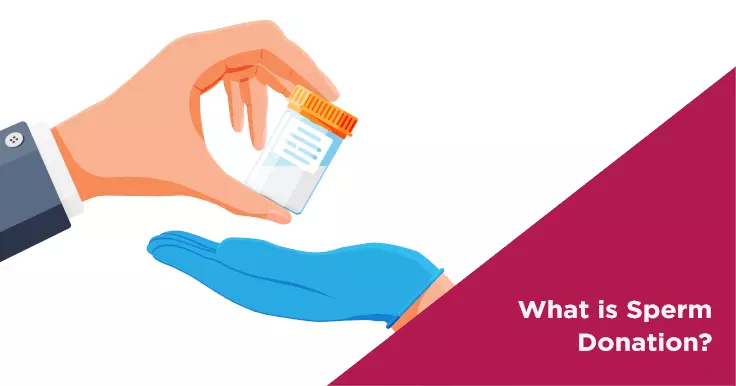What Is the Concept of Donor Sperm?
The sperm retrieved from a donor is known as donor sperm. The term, donor sperm, helps maintain the anonymity of third-party reproduction. Donor sperm for IVF treatment is generally obtained from a sperm bank, which is essentially a storing facility for healthy sperm donated by men.
When the requirement for a particular sperm sample comes, the sperm bank provides the fertility clinic with frozen requested sperm sample. This sperm sample is later prepared and used for fertilising an egg.
Sperm Donor Requirements—Screening Process for Sperm Donation
Before sperm donation, the donor's medical conditions and other risks are evaluated through a series of tests. Medical history of at least two generations is taken into consideration and presence of a hereditary disease disqualifies a person from becoming a donor. Most sperm banks allow donors between the age of 18 and 35 to donate their sperm. The donor's blood sample is tested for certain genetic conditions and for infectious diseases. Additionally, his semen sample is tested for the quantity, quality, and motility of sperm. The donor's personal and sexual history and his educational qualification, occupation, and other interests are documented.
A man is eligible to be a sperm donor only after a tedious screening process. The screening process may vary from sperm bank to sperm bank.
Additionally, before the sperm donation, all donors must sign an informed consent, in which they also give up parental rights over children conceived from their sperm.
Sperm Donation Process
Here is a basic guideline on how sperm donation process works:
Step 1: Registration
To be a part of sperm donation program, you need to register at a board-certified sperm bank, where they will ask for information related to your qualification, age, race, overall health, sexual partners, and family medical history.
Step 2: Screening Process
If a man passes the initial screening phase, they will be called for tests to check for infections and the presence of genetic abnormalities. As a sperm donor, you may be required to test for gonorrhoea, hepatitis B, chlamydia, streptococcal infections, trichomonas, syphilis, and others.
Certain donors are excluded from the program if they or their sexual partners have any of the following:
- A blood transfusion in the past 1 year
- Multiple sexual partners
- Drug use or history of drug use through injections
- History of genital herpes
Step 3: Paperwork
After being selected for the donor program, a man is required to sign off on legal agreements and consent forms related to the use of their sperm, their parental rights on the offspring, and compensation for sperm donation.
Step 4: Sperm donation
Depending on the sperm donation program a sperm donor is in, they will be required to provide fresh semen samples at a private room. The frequency of donations may vary depending on several factors, and the sperm donor may be required to provide fresh samples several times during a week for a certain period.
Step 5: Sperm Storage
After the donor has provided a fresh semen sample to the bank or a fertility clinic, the fertility doctors will likely assess the quality of the sample and prepare its storage for extended periods of time.
Step 6: Compensation
Depending on the agreement, the sperm donor usually receives their compensation in their bank account or by other means after their sperm sample has been tested for quality. However, this process may vary from one facility to another.
How Much Will It Cost for Sperm Donation Procedure?
The cost of sperm donation is usually not the responsibility of the sperm donor in India; the intended parents bear the cost of the donation. The average cost of donor sperm in India usually ranges from ₹8,000-₹10,000, but it can go as low as ₹1,000 and as high as ₹20,000.
Who Needs Sperm Donation?
Availability of donor sperm is a boon for women who do not have a male partner but wish to conceive and raise a child. Couples who struggle with male infertility due to lack of sperm or poor-quality sperm also opt for donor sperm to conceive their child.
Benefits of Choosing Nova IVF for Sperm Donation
Here are some of the benefits of partnering with if you want to become a sperm donor:
- Fair compensation
- Transparent communication
- Thorough medical tests
- Quick and easy process
- No legal liabilities
Conclusion
Now that you understand what sperm donation is and how does the process usually work, you may have an appreciation for the sperm donors who donate the essence of life to individuals and couples in need.
If you are interested in becoming a sperm donor, contact Nova IVF Fertility today.
 Infertility Counselling
Infertility Counselling Female Infertility Treatment
Female Infertility Treatment Andrology Treatment
Andrology Treatment Fertility Enhancing Surgeries - Female
Fertility Enhancing Surgeries - Female Fertility Enhancing Surgeries - Male
Fertility Enhancing Surgeries - Male Endoscopy Treatment
Endoscopy Treatment IUI Treatment
IUI Treatment IVF Treatment
IVF Treatment ICSI Treatment
ICSI Treatment Advanced IVF Solutions
Advanced IVF Solutions Embryology
Embryology Vitrification Egg, Embryo, Sperm Freezing
Vitrification Egg, Embryo, Sperm Freezing Preimplantation Genetic Testing (PGT)
Preimplantation Genetic Testing (PGT) Donation Program Embryo / Egg / Sperm
Donation Program Embryo / Egg / Sperm Self-cycleTM IVF
Self-cycleTM IVF

 Self-cycleTM IVF
Self-cycleTM IVF








